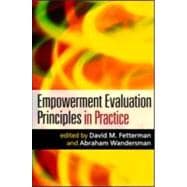
Note: Supplemental materials are not guaranteed with Rental or Used book purchases.
Purchase Benefits
Looking to rent a book? Rent Empowerment Evaluation Principles In Practice [ISBN: 9781593851149] for the semester, quarter, and short term or search our site for other textbooks by Fetterman, David M.; Wandersman, Abraham. Renting a textbook can save you up to 90% from the cost of buying.
| A Window into the Heart and Soul of Empowerment Evaluation: Looking through the Lens of Empowerment Evaluation Principles | p. 1 |
| The Principles of Empowerment Evaluation | p. 27 |
| Empowerment Evaluation Principles in Practice: Assessing Levels of Commitment | p. 42 |
| Lessons That Influenced the Current Conceptualization of Empowerment Evaluation: Reflections from Two Evaluation Projects | p. 73 |
| Empowerment Evaluation: From the Digital Divide to Academic Distress | p. 92 |
| Organizational Functioning: Facilitating Effective Interventions and Increasing the Odds of Programming Success | p. 123 |
| Empowerment Evaluation and Organizational Learning: A Case Study of a Community Coalition Designed to Prevent Child Abuse and Neglect | p. 155 |
| Will the Real Empowerment Evaluation Please Stand Up?: A Critical Friend Perspective | p. 183 |
| Conclusion: Conceptualizing Empowerment in Terms of Sequential Time and Social Space | p. 209 |
| Author Index | p. 215 |
| Subject Index | p. 220 |
| About the Editors | p. 227 |
| Contributors | p. 229 |
| Table of Contents provided by Ingram. All Rights Reserved. |
The New copy of this book will include any supplemental materials advertised. Please check the title of the book to determine if it should include any access cards, study guides, lab manuals, CDs, etc.
The Used, Rental and eBook copies of this book are not guaranteed to include any supplemental materials. Typically, only the book itself is included. This is true even if the title states it includes any access cards, study guides, lab manuals, CDs, etc.